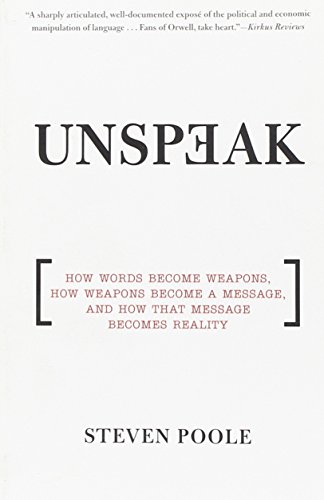
Unspeak: How Words Become Weapons, How Weapons Become A Message, And How That Message Becomes Reality
by
Steven Poole
Buy Now
Description
What do the phrases “pro-life,” “intelligent design,” and “the war on terror” have in common? Each of them is a name for something that smuggles in a highly charged political opinion. Words and phrases that function in this special way go by many names. Some writers call them “evaluative-descriptive terms.” Others talk of “terministic screens” or discuss the way debates are “framed.” Author Steven Poole calls them Unspeak. Unspeak represents an attempt by politicians, interest groups, and business corporations to say something without saying it, without getting into an argument and so having to justify itself. At the same time, it tries to unspeak — in the sense of erasing or silencing — any possible opposing point of view by laying a claim right at the start to only one way of looking at a problem. Recalling the vocabulary of George Orwell’s 1984, as an Unspeak phrase becomes a widely used term of public debate, it saturates the mind with one viewpoint while simultaneously makes an opposing view ever more difficult to enunciate. In this fascinating book, Poole traces modern Unspeak and reveals how the evolution of language changes the way we think.
Recent actions
-
toryah1988 has added Harry Potter And The Order Of The Phoenix to their read list.
-
toryah1988 has added Harry Potter And The Goblet Of Fire to their read list.
-
toryah1988 has added Atonement to their read list.
-
toryah1988 has added New Moon (The Twilight Saga) to their read list.
-
Monica has added The Da Vinci Code (Large Print) to their wish list.
